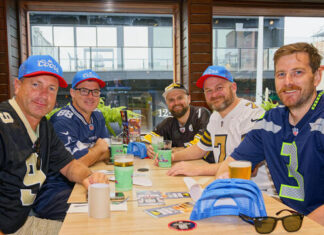 Counting the cost: Leading Senior Constable Darren Mighall and Senior Sergeant Shane Coles, both at front, with Leading Sen Constables Glenn Stephens and Andrew Champion.
Counting the cost: Leading Senior Constable Darren Mighall and Senior Sergeant Shane Coles, both at front, with Leading Sen Constables Glenn Stephens and Andrew Champion.
JOHN VAN KLAVEREN
THE members of Victoria Police Geelong Traffic Division are pretty good at maintaining a professional exterior.
“You have to be professional,” Senior Sergeant Shane Coles said, “otherwise we can’t do the job.”
These are the men who attend the serious collisions, where someone dies, where others may have suffered horrendous injuries.
They’ve all been doing it for a while. And they all have stories to tell about dealing with the aftermath of someone’s mistake on the road.
“We might do three or four fatals a year on average, often with serious injuries involved as well,” Sen Sgt Coles said.
“Kids are always hard.”
His squad murmurs in agreement.
“Then it’s dealing with the family reaction.
“Families always look for the reasons why and sometimes when we tell them the reason it’s really hard for them to accept.”
Families often turned to the investigating officer because they knew of nowhere else to go.
Sen Sgt Coles said police lived with the event for three to six months while carrying out the investigation.
“Dealing with the family during that time, you can feel a bit like a counsellor or psychologist. Often we’ll refer them to (counselling and support body) Road Trauma Support Services Victoria.”
One of the squad members admitted he sometimes had a chat with the police psychologist.
The admission took the others by surprise.
“It builds up after a while,” he said quietly.
Police have peer support officers and a welfare section, although the squad members gave the impression that sometimes informal supports were of greater value than the structured assistance.
“The banter between the blokes can help,” Sen Sgt Coles said.
“You need to keep your sense of humour even though sometimes it might be a bit black because we all need to have some release, like the medical profession.
“You can put cases behind you and then there’ll be some trigger and it will bring it all back.”








